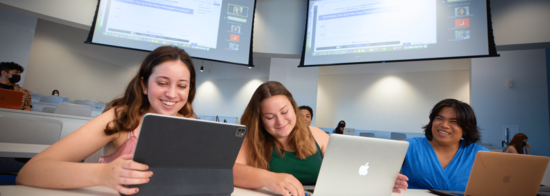BEAR NECESSITIES
Powered by the Student Technology Fee
UC Riverside has long been committed to effective teaching and learning through innovative instructional techniques and methodologies. Recent global events have further highlighted the need for investment in agile instructional technologies and collaboration tools to enable student and faculty success.
The Student Technology Fee (STF) allows UCR to strategically invest in technologies that bolster a high-tech teaching and learning environment for students and faculty. Across campus, you'll find the Bear Necessities label on student technology and equipment that was made possible by STF contributions.
SUPPORTING FOUR MAJOR CATEGORIES OF PROJECTS AND INITIATIVES
-
Enhancing Student Access to Learning Content and Systems: As an ever-increasing amount of online learning content is available to students and as students and instructors increasingly interact with one another over the network, ubiquitous access to this networked content becomes vital to a successful learning environment.
-
Supporting Innovative Pedagogy through Improvements to Campus Learning Spaces: Learning spaces must support new and innovative pedagogies that foster student engagement and success via active, participatory learning approaches. Moreover, these same learning environments must support evolving curricular delivery models that include remote presentation of materials, course capture, and course “streaming” in real time.
-
Improving and Enhancing UCR’s Learning and Collaboration Environments: Academic collaboration environments, both virtual and physical, are essential to an effective learning experience. For example, the online learning management system (LMS), referred to as "iLearn", is used to electronically facilitate campus curricular delivery, enable collaboration between students and faculty, and provide course assessment and feedback to students. Projects to enhance the iLearn environment, physical campus spaces along with other learning and collaboration spaces are routinely funded by STF.
-
Supporting the Creation of Digital Content, eLearning Objects, and Blended Learning Environments: As teaching approaches evolve and technologies become available that enable additional methods of instructor / student and student / student engagement, UCR will need support for the creation and utilization of a broad suite of new digital learning content as well as systems for the deployment of this content within innovative curricular delivery models (e.g. blended learning approaches).
The Student Technology Fee (STF) is assessed on each student's tuition bill each quarter.
PROVIDING DELIBERATED GUIDANCE, FEEDBACK, AND RECOMMENDATIONS
Guidance is provided by the Student Technology Fee Advisory Committee (STFAC) to the to the Chief Information Officer (CIO) and Provost regarding the appropriate allocation of the STF funds.
Student Technology Fee Advisory Committee (STFAC) Charge:
The STFAC is charged with providing appropriate guidance, feedback and recommendations for all projects and initiatives funded via the Student Technology Fee. The Committee will specifically provide this input as follows:
- This Committee will review project justification, progress, funding and costs associated with long-term projects (as defined below) on an annual basis.
- The Committee will review and advise the CIO on the merit and priority of new project requests from campus constituents.
- The Committee will evaluate short-term projects (as defined below) funded by proceeds that are not allocated to any continuing, ongoing projects.
- The Committee’s recommendations, advice and input will be provided to the campus CIO who will make final decisions relating to utilization of the Student Technology Fee, in collaboration with the Provost.
ADVISORY COMMITTEE (STFAC) MEMBERS
2025-2026 Student Technology Fee
| Member Name | Title | STFAC Role |
|---|---|---|
| Rebecca Hutchins | Chief Experience Officer, ITS | Chair |
| Shelley Gupta | Chief Financial & Administrative Officer, ITS | Co-Chair |
| Prof. Erica Heinrich | Assistant Professor, Biomedical Sciences | Academic Senate Member |
| Prof. Joel Mejia Smith | Professor, Dance | Academic Senate Member |
| Anthony Ching | College of Natural and Agricultural Sciences, Senator | Associated Students of the University of California Riverside |
| Bruce Riazi | Bourns College of Engineering, Senator | Associated Students of the University of California Riverside |
| Chloe Want | Personnel Director | Associated Students of the University of California Riverside |
| Jordan Steinhauser | Graduate Student Association, President | Member |
| Louie Rodriguez | Vice Provost and Dean for Undergraduate Education | Member |
| Lidia Kos | Dean of the Graduate Division | Member |
| Matt Gunkel | Chief Information Officer, ITS | Advisory Position |
| To Be Determined | IT Academic Senate Committee Nominated Faculty Member |
GRADUATE QUANTITATIVE METHODS CENTER
Graduate Quantitative Methods Center (GradQuant) is dedicated to providing quantitative methods, computer programming, and digital research methods training to all UCR graduate students and postdoctoral scholars through free, individualized consultations and workshop programming.
SENSUSACCESS
SensusAccess is a proven technology option for students, faculty, staff, and others at UCR to easily convert non-accessible documents into alternate formats so that the information is accessible for individuals who have print-related disabilities or need to use assistive technology to read information.



